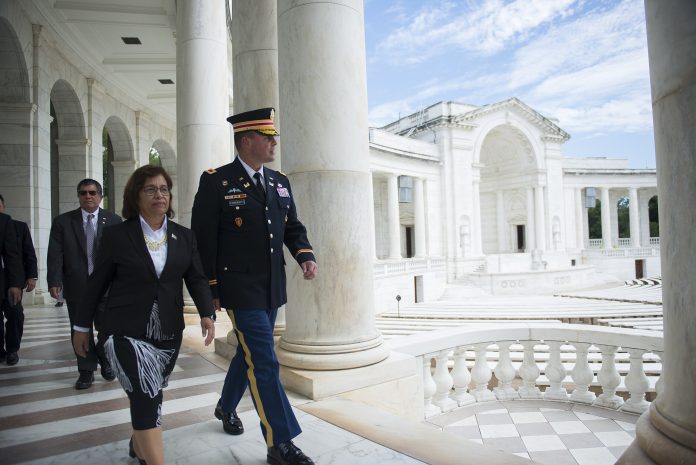By Jia H. Jung, California Local News Fellow
Last Friday at the East-West Center (EWC) in Honolulu, Dr. Hilda C. Heine, president of the Republic of the Marshall Islands (RMI), received the 2024 Women of Impact Award.
Established in 2022, the award recognizes individuals whose accomplishments, civic leadership, and fostering of better relationships and understanding among the people of Asia-Pacific and the U.S. have positively impacted governance, diplomacy, and society.
Hawai‘i-based Filipino American civil rights champion Dr. Amefil “Amy” Agbayani and Japanese American U.S. senator Mazie Hirono received the award in 2023 and 2022, respectively.
As the first woman to lead an independent Pacific Island nation in post-colonial times and the first person from the RMI to earn a doctorate degree, President Heine, 73, has established herself as a gender equality, women’s empowerment, education and environmental advocate in times of climate change.

Before entering the political arena, Heine was a classroom teacher, a school counselor, founding president of the College of Micronesia, and secretary of the Ministry of Education.
In 1987, she co-founded Women United Together Marshall Islands (WUTMI). Established as an organization combating violence against women and providing counseling services for survivors, WUTMI has expanded over the decades to promote the advancement of women, families, and future generations as peacemakers, protectors, providers and stewards of the environment and Marshallese culture and heritage.
Heine was elected senator in 2011 and appointed Minister of Education after running for office on a platform of education reform. The Nitijeļā 33-member Marshallese parliament appointed her president in 2016, replacing Casten Nemra one week into his term.
In 2018, under President Heine’s leadership, the RMI became the first country in the world to submit a Nationally Determined Contribution (NDC) – an action plan submitted to the United Nations Framework Convention on Climate Change (UNFCCC), with binding targets conforming with the Paris Agreement.
The targets included reducing greenhouse gas emissions to at least 32% below 2010 levels by 2025 and to at least 45% below 2010 levels by 2030.
The administration also launched the Tile Til Eo (“lighting the way”) strategy to reach net-zero emissions and 100% renewable energy by 2050 – a simultaneously utopic and necessary goal for the low-lying island nation that is quickly sinking under rising tides.
After a term by David Kabua, son of the RMI’s first and five-time president Amata Kabua, Heine became voted into the presidency once more by the Nitijeļā in the Marshallese general election in 2023.
As a member of the East-West Center’s board of governors from 2021 to 2023, Heine accepted the award from the board’s present chair and former Hawai‘i Governor John Waihe‘e.

Current Hawai‘i Governor Josh Green also presented Heine with an official proclamation honoring her contributions and leadership in the Pacific. In a pre-recorded video statement, Erika Moritsugu, White House deputy assistant to the President and Asian American and Pacific Islander senior liaison, read aloud a letter of congratulations from President Biden.
With support from the First Hawaiian Bank Lecture Series, a panel of distinguished women leaders from around the world also joined the program to share their personal stories and discussed their strategies for professional success.
In her statement at the ceremony, Heine said the distinction was unexpected, and that she accepted the honor on behalf of those who have come before her.
Emphasizing the building of bridges and community networks, she said, “There is that Western saying, ‘No person is an island.’ It’s a concept that our islander cultures have known for millennia, and that my mother and father taught me as well: We are only as strong as our communities and our kinship to one another.”
Part of the community is her daughter, Kathy Jetn̄il-Kijiner, a heralded poet and climate activist.
Heine’s second presidency is wrapped in peak existential crisis for the islands, which have prevailed against all odds only to be on the front lines of the ravages of climate change and caught in the middle of re-escalating geopolitical tensions between the Cold War mega-powers of the U.S. and China.
The Marshall Islands have an average altitude of six feet above sea level. The Micronesian nation is made up of 1,156 islands in 29 atolls strewn over 750,000 square miles of ocean. The total land mass of these islands is just under 70 square miles – comparable to the area of Washington, D.C.
After centuries of colonization by Spain and Germany with interference starting in the mid-1800s by American Protestant missionaries, the Marshall Islands also suffered occupation by Imperial Japan during World War II. The United States, after defeating Japan, made a strategic post out of the islands as it did across many other sites of the WWII Pacific Theater.
The Marshalls stood out as the only islands chosen for extensive atomic bomb experimentation. The U.S. conducted 67 detonations from 1946 through 1958 in the RMI, at sites along the Enewetak, Rongelap, and Bikini atolls (namesake of the two-piece swimwear that made an explosive entrance to the fashion scene in 1946).
Survivors of the bombing underwent displacement, short and long-term effects of radiation, and medical experimentation. The land and natural environment of the RMI, devastated and poisoned, remains prone not only to flooding and king tides but to drought, pollution, saltwater in an already severely limited fresh water supply, decline in marine resources, and other threats to livelihood and self-sufficiency.
Those hanging onto the islands are packed onto the capital atoll of Majuro and the urban slums of Ebeye on Kwajalein atoll. Or, they are scattered on outer islands which often lack running water, electricity, communications, health services, or dependable transportation in or out.
People escaping these conditions have relocated, most often to Hawai‘i, Northwest Ark. (NWA), Okla., and Spokane, Wash.
The Hawaiian Islands and “the NWA” are home to approximately 15,000 Marshallese people each, respectively constituting 1% and 3% of the population in these places. These numbers seem comparatively small but represent over the half of the population of the Marshall Islands that has left home in search of higher ground and better chances of survival.
Since 1986, the Compact of Free Association (COFA) has been the main engine facilitating migration from the Marshall Islands to the U.S.
COFA is a special relationship between the U.S. and the Marshall Islands (along with Republic of Palau, and the Federated States of Micronesia (FSM) comprised of Yap, Chuuk, Pohnpei, and Kosrae) in light of the countries’ intertwined military past and present.
In March, Congress renewed the expiring arrangement with amendments as part of the Consolidated Appropriations Act, 2024.
In his statement for the press release about the new law, House Committee on Natural Resources Chairman Bruce Westerman (R-Ark.) said, “Our allies in the Indo-Pacific can rest assured that the United States stands hand-in-hand with them as they resist the malign influence of the Chinese Communist Party.”
The revamped COFA continues to give the U.S. “sole and unfettered military access to the lands, waters and airspace” of the Marshall Islands and the other Freely Associated States (FAS).
One example of this is the continuing American military presence in the RMI, most significantly on a base on Kwajalein Atoll that operates around the clock, firing missiles daily and nightly out of the Ronald Reagan Ballistic Missile Defense Test Site.
On the flip side, COFA allows Marshallese people to enter the U.S. by application as nonimmigrants without visas. If admitted, they can live, work, and study in the U.S., and volunteer for the U.S. armed forces if they wish.
These allowances do not equate to Lawful Permanent Resident status or citizenship.
Thus, many economic and climate refugees from the RMI fall prone to discrimination and misunderstanding in American society while suffering from poverty, health disparities, educational hurdles, lack of career opportunities, and mental health challenges aggravated by these circumstances.
The amendments that renewed COFA restored eligibility for federal benefits such as the Supplemental Nutrition Assistance Program (SNAP), formerly known as “food stamps.” U.S. Senator Mazie Hirono (D-HI), and Congressmen Ed Case (D-HI-01) and Steve Womack (R-AR-03) advocated for this in a co-sponsored Compact Impact Fairness Act (CIFA) bill to relieve states like Hawai‘i and Ark. of the sole burden of caring for a disproportionate number of FAS-originating populations.
In Arkansas, SNAP eligibility kicked in at the beginning of this month after three decades of fighting by Marshallese American advocates such as Majuro born-and-raised U.S. Army veteran Melisa Laelan, founder and executive director of the Arkansas Coalition of Marshallese in Springdale.
Laelan has also helped extend Medicaid to Marshallese children and COFA migrants, and lobbied for House bills 1488 and 1789, which serve to protect Marshallese mothers and children against adoption schemes and trafficking.
Marshallese and other FAS citizens still cannot vote in American elections that will affect their daily lives in the U.S., or foreign policy decisions that will determine the future of their home islands and the people remaining there.
Therefore, they depend on advocates like Laelan, lawmakers like Sen. Hirono, and Marshallese leaders like President Heine to represent their needs in the U.S. and abroad.
As the influx of climate refugees grows and the story of their struggles becomes better known, the conceptual distance between the faraway islands and COFA migrants living in American communities is closing.
President Heine has been seeking support for the human rights of the Marshallese people through international law, pointing out the endangerment of climate change and the historic violations of American nuclear testing and scientific experimentation.
A month before her award, President Heine addressed the U.N. Human Rights Council at its 57th session in Geneva, Switzerland. She introduced a cross-regional core group of the RMI, Bahamas, the European Union, Fiji, Panama, Paraguay, and Sudan pursuing renewal of the mandate of the Special Rapporteur set forth in 2021 to protect and promote human rights in the face of climate change.
She also raised the ongoing nuclear legacy and a call for “genuine reconciliation” of “uncomfortable truths” further revealed by recently declassified documents about American nuclear testing in the Marshall Islands.
President Heine announced that the Federated States of Micronesia, Fiji, Kiribati, Nauru, Samoa, and Vanuatu joined the Marshall Islands in the quest for justice, and the financial commitment required to achieve it.
‘The pursuit of justice has been a long, winding road of pain and suffering for our people,” President Heine said. “While it can be tiring and extremely difficult at times, we remain steadfast, and our resolve strengthens with the growing recognition of the injustices that we have faced and continued to face.”
Neither U.S. presidential candidate has highlighted their intentions in regard to the COFA nations, despite Vice President Kamala Harris’s vocal commitments during the U.S.- Pacific Islands Forum summits of 2022 and 2023. The region, which produces no direct voters for the next American president, has also been overshadowed by hot conflicts in other regions.
Domestically, Vice President Harris has supported the Biden administration’s push for disaggregated data to capture the distinct experiences and needs of Native Hawaiians and Pacific Islanders, plus social justice initiatives in sectors such as health care, housing, and labor.
The fate of Micronesia as it drives migration of Micronesians to America, however, was relegated in the same White House fact sheet to COFA negotiations considered a world away from domestic conversations.

In matters of foreign policy, the vice president has shown enthusiasm for “true partnership and a friendship based on mutual respect, mutual trust, and mutual benefit” in bringing about America’s vision for a “resilient Pacific region of peace, harmony, security, social inclusion, and prosperity, where individuals can reach their potential, the environment can thrive, and democracy can flourish.”
Throughout their campaigns, the presidential candidates have not stated how America will handle the lasting root problems of America’s nuclear testing in the Marshall Islands or how they will care for those who can only be described as permanent nonimmigrants.
The Interpreter recently reported that Marshallese people and other Pacific Islanders, whether they can vote on Nov. 5 or not, will want to know specifics, such as when the U.S. will follow through on a 2023 pledge to boost the Green Climate Fund by $3 billion and apply $1 billion devoted to sustainable development in the COFA region.
Whoever becomes the next American president will also implement the U.S. Senate’s commitment of over $7 billion to the COFA nations over the next 20 years. This is the price tag to continue increasing America’s military and diplomatic hold in the RMI.


AsAmNews is published by the non-profit, Asian American Media Inc.
We are supported through donations and such charitable organizations as the Robert Wood Johnson Foundation. All donations are tax deductible and can be made here.
Please purchase your tickets to our fundraiser Up Close with Connie Chung, America’s first Asian American to anchor a nightly network newscast. The in-depth conversation with Connie will be held November 14 at 7:30 at Columbia University’s Milbank Chapel in the Teacher’s College. All proceeds benefit AsAmNews.







